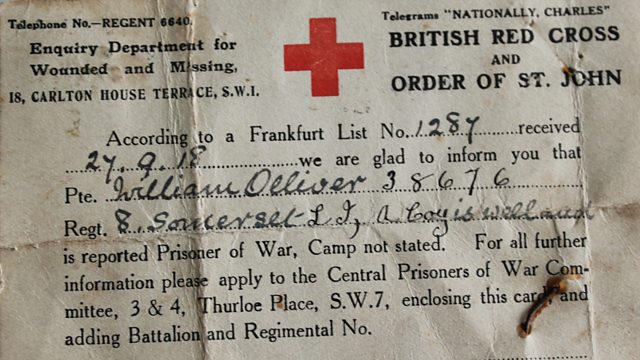St Michael’s Mount, Cornwall: Cornish Prisoners of War
Living with the enemy - two Cornish soldiers experience German PoW camps
Living with the enemy - two Cornish soldiers experienced prisoner of war (PoW) camps. One claimed a German surgeon saved his life; another suggests a prison guard who had once worked in Penzance made his time in the camp more bearable.
Cornishman Private William Oliver of the 8th Battalion Somerset Light Infantry became a PoW in April 1918, but suggested he was well treated by a German who had a love for Cornwall because he had worked there some years before.
Redruth, born William Oliver, had joined the army in 1914 aged just 15. Four years later in April 1918 he found himself at the Friedrichsfeld camp at Bie Wesel. The news of his capture took almost five months to reach his mother back in Redruth, Cornwall.
His granddaughter, Sue Martin from Falmouth, reflects on how William’s mother may have felt on receiving the news:
“A Red Cross postcard that was sent to my great grandmother in 1918 to say that he was alive and a prisoner of war and I often wonder how on earth you must feel if this was your son finding out he was a prisoner of war and you get it in the post as if it were a normal piece of mail, it must have been quite frightening.”
In a letter home William seeks to reassure his mother:
“We are as prisoners having fairly decent treatment and as time goes on treatment gets better. We get an allowance of milk every day and we got new underclothing given to us and our boots repaired so truly speaking we can push on with it for the duration of the war. The hardest part of it has been this writing home question.” (William Oliver, 1918)
William letters suggest he had better treatment than most other PoW’s in part thanks to a German guard who had once lived and worked in West Cornwall.
“Since I’ve been a prisoner I’ve met a German guard who used to work down at Penzance. When I told him I came from Redruth he was surprised, he knew Redruth, Camborne very well. Well mother I hope this letter will relieve your mind and you can rest assured it has mine and remember me to all at home. I now close, I remain your loving son.” (William Oliver, 17 September 1918)
Meanwhile another Cornishman became a POW after being badly wounded by shrapnel. John Matthews who was born on St Michael’s Mount on 20 December 1898 enlisted with Worcester Regiment on 27 February 1917 later transferring to the Kings Shropshire Regiment.
John was seriously wounded, as his grandson, also named John Matthews, explains:
“When he came round again he was in a shell hole and was being confronted by a German soldier pointing his rifle at granddad, he thought the German was going to shoot him but instead the German stuck his bayonet into the mud so granddad could pull himself out of the shell hole. He was taken to the German field dressing station where his wounds were treated. My granddad was always thankful to that German doctor, it would have been easier to cut off his leg but that doctor worked hard and saved his leg, my granddad was always thankful for that. He was a prisoner of war till the end of the war.”
John Matthews met his future wife at a British hospital just after the war. Having said goodbye then, the pair were reunited by complete chance a couple of years later:
“It was 1921 when my granddad watched the boat come into the Mount harbour and the occupants disembark. Granddad thought ‘I know that walk, I know that hat’ and so he walked up to the young woman and said ‘what in tarnation are you doing here?’ – to which the young woman replied that she was the new maid up the castle. They ended up walking out and eventually got married and stayed totally devoted to each other till my granddad died 67 years later.”
William Oliver’s experience as a prisoner of war became apparent generations later for his granddaughter, Sue:
“I must have been about seven or eight, maybe ten, and we were out somewhere walking one day and I said to him I don’t want to go any further I’m tired and hungry. And he said ‘you’re not hungry you don’t know what hunger is’ and I said I do and I’m not going any further. He looked down at me because I sat on the grass. He said if a German soldier had held a gun to your head injured or not you’d get up and march so get up and move.’ And I said well that’s not going to happen. That only came back to me recently when I was reading all these memoirs of my grandfather and I remember thinking at the time what’s he talking about - but now I know.”
Location: St Michael’s Mount, Cornwall TR17 0HS
Image: Red Cross certificate sent to Private William Oliver’s family delivering the news that he was PoW. Photographed courtesy of Sue Martin
Duration:
This clip is from
Featured in...
![]()
����ý Radio Cornwall—World War One At Home
Places in Cornwall that tell a story of World War One
More clips from World War One At Home
-
![]()
The loss of HMY Iolaire
Duration: 18:52
-
![]()
Scotland, Slamannan and the Argylls
Duration: 07:55
-
![]()
Scotland Museum of Edinburgh mourning dress
Duration: 06:17
-
![]()
Scotland Montrose 'GI Brides'
Duration: 06:41







